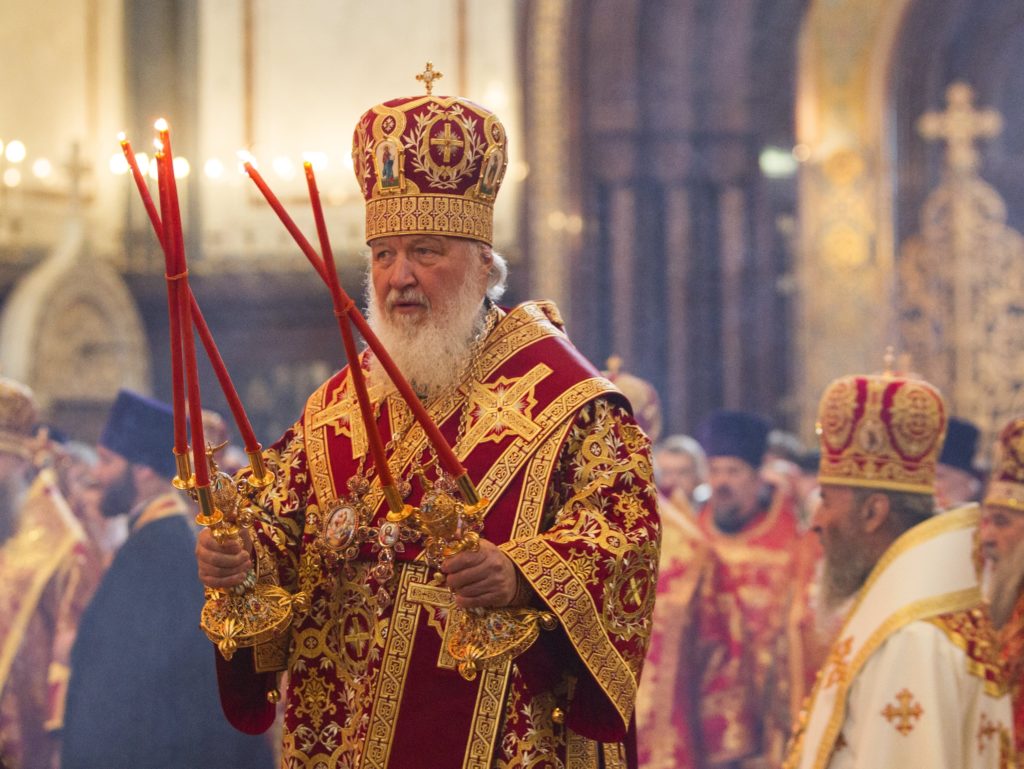Russian Orthodox Patriarch Kirill, responding to a request that he intervene with Russia’s leaders to end the war in Ukraine, accused the west of disregarding Russia’s security concerns and stoking tensions between the two countries in a bid to weaken Russia.
In his response to a March 2 letter from acting secretary general of the World Council of Churches Reverend Archpriest Ioan Sauca, a senior priest from the Orthodox Church of Romania asking him to appeal to Russian President Vladimir Putin to end the war in Ukraine, Kirill went on the defensive.
He did not directly respond to Sauca’s request to intervene, but rather defended Russia from what he said is a strategic plot to deprive it of its regional power.
In his letter, dated March 10 and addressed to Sauca, Kirill noted that the Russian Orthodox Church joined the WCC in 1961, and quoted the Toronto Statement, drafted after a WCC committee meeting in 1950 to clarify several key questions about the nature of the WCC and its relationship to member churches.
Kirill quoted a passage from the Toronto Statement which states that the WCC “cannot possibly become the instrument of one confession or school <…> the member churches should recognize their solidarity with each other, render assistance to each other in case of need, and refrain from such actions as are incompatible with brotherly relationship.”
Members of the WCC, Kirill said, share responsibility for “justice, peace and the integrity of creation within the world community,” and a commitment for reconciliation among peoples, as well as solidarity and support for the world’s Christians.
Pointing to the current conflict in Ukraine, Kirill said it is at the heart of the “thoughts and prayers” for Christians globally, but he cautioned that “this conflict did not start today.”
“It is my firm belief that its initiators are not the peoples of Russia and Ukraine, who came from one Kievan baptismal font, are united by common faith, common saints and prayers, and share common historical fate,” he said.
Rather, Kirill faulted the relationship between Russia and the West, saying Russia by the 1990s had been promised that “its security and dignity would be respected.”
“However, as time went by, the forces overtly considering Russia to be their enemy came close to its borders. Year after year, month after month, the NATO member states have been building up their military presence, disregarding Russia’s concerns that these weapons may one day be used against it,” he said.
“Moreover, the political forces which make it their aim to contain Russia were not going to fight against it themselves,” he said, and accused them of inciting hatred amongst the “brother peoples” of Russia and Ukraine.
These western forces spared no effort or expense “to flood Ukraine with weapons and warfare instructors,” Kirill said, and accused the West of attempts to “re-educate” Ukrainians and “mentally remake” them into enemies of Russia.
He also faulted Patriarch Bartholomew of Constantinople, who, he said, pursued the same ends when he established a new Orthodox body in Ukraine by granting autocephaly to the Ukrainian Orthodox Church in 2018, against Kirill’s wishes.
When Ukrainians ousted their pro-Russian president in 2014 amid a swath of deadly protests, the WCC secretary at the time, Dr. Olav Fykse Tveit, voiced concern that “the situation puts many innocent lives in grave jeopardy” and “risks undermining the international community’s capacity to act now or in the future on the many urgent issues that will require a collective and principled response.”
Shortly after, Russia annexed the Crimean Peninsula and further conflict broke out in the eastern Ukrainian Donbass region as Russia backed separatists in Donetsk and Luhansk.
This conflict was being waged by people “whose population was defending their right to speak the Russian language, demanding respect for their historical and cultural tradition,” Kirill said, responding to allegations that Ukraine had made it illegal to speak Russian in the region.
The conflict in Donbass “has become a part of the large-scale geopolitical strategy aimed, first and foremost, at weakening Russia,” he said, and pointed to the crippling sanctions that have been placed on Russia since they first invaded Ukraine Feb. 24.
Rather than punishing Russia’s leaders, the results of these sanctions will be “harmful to everyone,” he said, saying the powers that imposed the sanctions have made their intentions “blatantly obvious – to bring sufferings not only to the Russian political or military leaders, but specifically to the Russian people.”
“Russophobia is spreading across the Western world at an unprecedented pace,” he said, and prayed that God would “help establish the lasting and justice-based peace as soon as possible.”
He asked other members of the WCC to join him in this prayer and plead with Sauca to ensure that the WCC remains “a platform for unbiased dialogue, free from political preferences and one-sided approach.”
Kirill’s letter comes as he faces mounting criticism for his apparent backing of Putin’s decision to invade Ukraine, having made several statements in recent days outlining a clear pro-Russia position.
On March 6, when the Russian Orthodox Church observed “Forgiveness Sunday” before the beginning of their Lent, Kirill backed separatists in Ukraine’s eastern Donbass region and suggested that an unnamed western body of nations is organizing genocide campaigns against countries that refuse to hold gay pride parades.
On March 9, during the Lenten Liturgy of Presanctified Gifts, Kirill delivered another sermon in which he referred to Russians and Ukrainians as “one people” and accused the West of supplying Ukraine with weapons in a bid to weaken Russia out of a growing fear of how powerful Russia had become.

